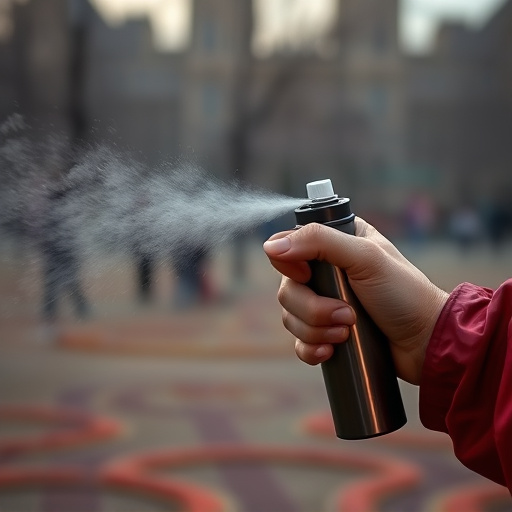Bear spray and personal pepper spray offer distinct self-defense options. Bear spray is designed for animal deterrence in wild areas, using a mist of capsicum-based ingredients at a range up to 30 feet. Personal pepper spray focuses on close-range (4-5 foot) attacks, causing severe irritation and temporary blindness. Bear spray has a longer reach but less potent chemicals; personal pepper spray offers higher concentration for easier escape in urban settings. Choose based on environment, specific needs, legal aspects, and required protection level.
In today’s world, personal security is paramount. Among various self-defense tools, bear spray and personal pepper spray stand out as effective inflammatory defenses. This article delves into the fundamentals of these powerful tools, exploring their unique benefits and drawbacks. We compare active ingredients and safety features to help you choose the right defense for your specific needs, clarifying the differences between bear spray and personal pepper spray.
- Understanding Bear Spray: The Basics and Benefits
- Personal Pepper Spray: A Closer Look at Its Effectiveness
- Comparing Active Ingredients and Safety Features
- Choosing the Right Self-Defense Tool for Your Needs
Understanding Bear Spray: The Basics and Benefits
Bear spray, a specialized defense product designed for outdoor enthusiasts, offers a powerful yet non-lethal means of deterring bears during encounters. Unlike personal pepper spray, which primarily targets human aggressors, bear spray is specifically formulated to disrupt an animal’s behavior and create a safe escape route. This product emits a strong, irritant aerosol that can effectively stop an approaching bear without causing severe injury or death.
One key advantage of bear spray over personal pepper spray is its range and reliability in various conditions. Bear spray can reach distances up to 30 feet, allowing users to defend themselves from a safer distance. Moreover, it remains effective even in windy or damp environments, ensuring better performance when every second counts during a bear encounter. This makes it an indispensable tool for hikers, campers, and anyone venturing into bear country, providing peace of mind and enhanced personal security.
Personal Pepper Spray: A Closer Look at Its Effectiveness
Personal pepper spray is a popular choice for individuals seeking an effective and readily available self-defense tool. Unlike bear spray, which is designed for outdoor adventures and repels larger wildlife, personal pepper spray targets close-range attacks by temporarily blinding and disorienting assailants. This direct action makes it a powerful tool for personal security in various settings, from urban streets to rural areas.
When comparing bear spray vs. personal pepper spray, the key difference lies in their purpose and application. Bear spray covers a larger area but may not be as effective at close range, while personal pepper spray excels in close-quarters combat, ensuring users have a clear escape route after spraying. Its portability and ease of use make it an attractive option for everyday carry, providing individuals with the confidence to protect themselves in potentially dangerous situations.
Comparing Active Ingredients and Safety Features
When considering personal security, both bear spray and pepper spray offer effective defense options, but they operate differently. Bear spray, as the name suggests, is designed to deter bears, using capsicum-based ingredients in a mist form that can temporarily blind and disorient an attacker. In contrast, personal pepper spray targets the eyes, nose, and respiratory system of any assailant, causing severe irritation and discomfort that can enable escape.
In terms of safety features, bear spray has a wider range of effective distances, typically up to 20-30 feet, making it suitable for outdoor activities in bear country. Personal pepper spray, on the other hand, offers a shorter range of around 4-5 feet but is easier to use in close quarters. The active ingredients also differ; bear spray uses capsaicin and other chemicals that are less likely to cause permanent damage, while personal pepper spray contains more potent capsaicin, which can leave temporary blindness and respiratory distress.
Choosing the Right Self-Defense Tool for Your Needs
When considering self-defense tools, two popular options often arise: bear spray and personal pepper spray. The choice between them largely depends on your specific needs and environment. Bear spray, designed to deter bears, is effective at a longer range (up to 20 feet) and can be useful in wilderness settings. It’s ideal for outdoor enthusiasts, hikers, and campers who may encounter wildlife. On the other hand, personal pepper spray is tailored for close-range defense against humans and offers a shorter range (typically 3 to 5 feet). This makes it suitable for urban environments where threats are closer at hand.
Both options have their merits, but understanding your surroundings and potential threats is key. If you’re in areas known for bear activity or other wildlife encounters, bear spray may be the better choice. For city dwellers facing higher risks of close-range attacks, personal pepper spray offers a reliable and effective solution. Always consider factors like ease of use, legal restrictions in your area, and the level of protection needed to make an informed decision about which self-defense tool is right for you.
In exploring the world of personal security, understanding the nuances between bear spray and personal pepper spray is key. Both offer valuable defensive options, but their unique features cater to distinct needs. Bear spray proves effective against larger threats in outdoor settings, while personal pepper spray stands as a potent, close-range defense against various aggressors. When choosing your self-defense tool, consider the active ingredients, safety features, and specific situations that demand protection. Whether you’re hiking or securing your home, armed with knowledge, you can make an informed decision to enhance your personal security. Remember, staying prepared is half the battle won in ensuring your well-being.
